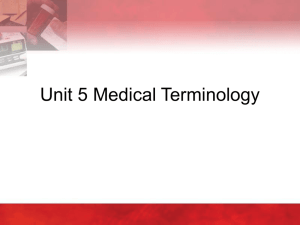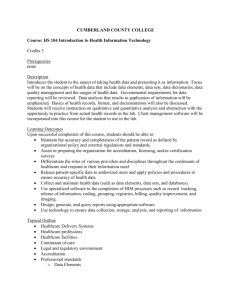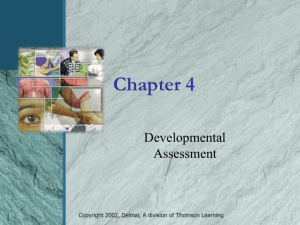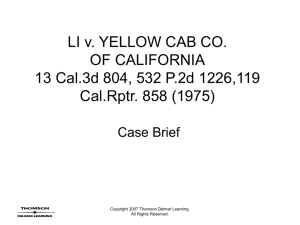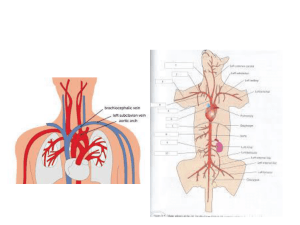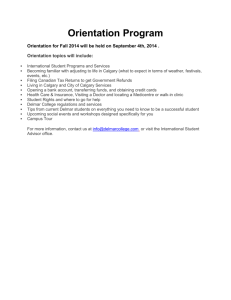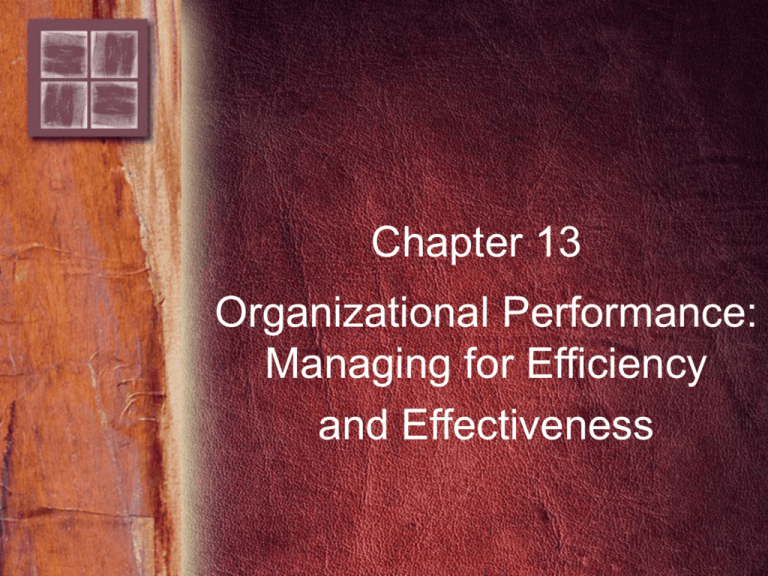
Chapter 13
Organizational Performance:
Managing for Efficiency
and Effectiveness
Purpose and Overview
• Purpose
– To review assessing organizational
performance
– To compare and contrast approaches to
quality assurance and quality improvement
– To describe strategies to achieve an effective
health care organization
Copyright © 2006 by Thomson Delmar Learning. ALL RIGHTS RESERVED.
2
Purpose and Overview
• Overview
–
–
–
The Challenge of Performance
Issues in Assessing Effective Performance
The Manager's Role in Creating HighPerformance Health Care Organizations
Copyright © 2006 by Thomson Delmar Learning. ALL RIGHTS RESERVED.
3
The Challenge of Performance
• Health Care Organizations
– Operate with constrained resources
– Maximize productivity, quality, and market
share
– Contain costs and minimize ineffective
services
Copyright © 2006 by Thomson Delmar Learning. ALL RIGHTS RESERVED.
4
The Challenge of Performance
• Managers must:
– Adapt organizations to ever-changing
environment
– Innovate rather than passively react
Copyright © 2006 by Thomson Delmar Learning. ALL RIGHTS RESERVED.
5
The Challenge of Performance
• Aspects of Organizational Performance
Assessment
– Efficacy
– Appropriateness
– Effectiveness
Copyright © 2006 by Thomson Delmar Learning. ALL RIGHTS RESERVED.
6
The Challenge of Performance
• Aspects of Organizational Performance
Assessment
– Productivity
– Efficiency
– Organizational Effectiveness
– Cost-Effectiveness
Copyright © 2006 by Thomson Delmar Learning. ALL RIGHTS RESERVED.
7
The Challenge of Performance
• Factors Associated with Increased
Productivity and Efficiency
– High standard and goals
– Information and feedback
– Interdepartmental coordination and resource
sharing
Copyright © 2006 by Thomson Delmar Learning. ALL RIGHTS RESERVED.
8
The Challenge of Performance
• Factors Associated with Increased
Productivity and Efficiency
– Compensation systems oriented toward
rewarding productivity or efficiency
– Physician involvement in decision making and
governance
Copyright © 2006 by Thomson Delmar Learning. ALL RIGHTS RESERVED.
9
The Challenge of Performance
• Factors Associated with Increased
Productivity and Efficiency
– Concentration of staff work and activity
– Active governing boards that deal with
environmental pressures
Copyright © 2006 by Thomson Delmar Learning. ALL RIGHTS RESERVED.
10
The Challenge of Performance
• Factors Associated with Increased
Productivity and Efficiency
– Type of ownership
– Chain ownership and contract management
– Degree of system integration
Copyright © 2006 by Thomson Delmar Learning. ALL RIGHTS RESERVED.
11
Issues in Assessing Effective
Performance
• Issues in Organizational Assessment
– Fundamental perspectives
– Domain of activity
– Stakeholders
Copyright © 2006 by Thomson Delmar Learning. ALL RIGHTS RESERVED.
12
Issues in Assessing Effective
Performance
• Issues in Organizational Assessment
– Different levels of analysis
• The organization itself
• Larger social unit that contains the
organization
• Subunits contained within organization
Copyright © 2006 by Thomson Delmar Learning. ALL RIGHTS RESERVED.
13
Issues in Assessing Effective
Performance
• Technical Issues in Assessment
– Classes of measures
• Structural
• Process
• Outcome
Copyright © 2006 by Thomson Delmar Learning. ALL RIGHTS RESERVED.
14
Issues in Assessing Effective
Performance
Copyright © 2006 by Thomson Delmar Learning. ALL RIGHTS RESERVED.
15
Issues in Assessing Effective
Performance
Copyright © 2006 by Thomson Delmar Learning. ALL RIGHTS RESERVED.
16
Issues in Assessing Effective
Performance
Copyright © 2006 by Thomson Delmar Learning. ALL RIGHTS RESERVED.
17
Issues in Assessing Effective
Performance
• Technical Issues in Assessment
– Preferences for classes of performance
measures
• Managers: structural
• Caregivers: process
• Clients: outcomes or results
Copyright © 2006 by Thomson Delmar Learning. ALL RIGHTS RESERVED.
18
Issues in Assessing Effective
Performance
• Technical Issues in Assessment
– Factors associated with effective performance
• Quality of professional staff
• High standards
• Experience with cases of same type
• Organized professional staffs and conflict
management processes
Copyright © 2006 by Thomson Delmar Learning. ALL RIGHTS RESERVED.
19
Issues in Assessing Effective
Performance
• Technical Issues in Assessment
– Factors associated with effective performance
• Participative cultures with team approaches
• Timely and accurate performance feedback
• Management of environmental forces
Copyright © 2006 by Thomson Delmar Learning. ALL RIGHTS RESERVED.
20
Issues in Assessing Effective
Performance
• Managerial Issues in Assessing
Performance
– Old model
• Quality relegated to quality assurance
department
– New model
• Quality improvement teams
Copyright © 2006 by Thomson Delmar Learning. ALL RIGHTS RESERVED.
21
Issues in Assessing Effective
Performance
• Managerial Issues
– Model for evaluating professional performance
• Autonomous
• Heteronomous
• Conjoint
• Modern health care is moving toward
conjoint model
Copyright © 2006 by Thomson Delmar Learning. ALL RIGHTS RESERVED.
22
Issues in Assessing Effective
Performance
• Managerial Issues
– Model for evaluating nonprofessional work
• Bureaucratic model
• Performance appraisal typically assigned to
a supervisor
• Interdisciplinary teams increasingly utilized
Copyright © 2006 by Thomson Delmar Learning. ALL RIGHTS RESERVED.
23
Issues in Assessing Effective
Performance
• Managerial Issues
– Impact of evaluation on all performers
• Expected to have effects on performance
• Evaluations are ideally accurate
Copyright © 2006 by Thomson Delmar Learning. ALL RIGHTS RESERVED.
24
Issues in Assessing Effective
Performance
• Two Models for Changing Performance
– Quality assurance
• Formal and systematic exercise to identify
problems
– Quality Improvement (QI)
• Management philosophy in which the
customer is central
• Process-focused
Copyright © 2006 by Thomson Delmar Learning. ALL RIGHTS RESERVED.
25
Issues in Assessing Effective
Performance
Copyright © 2006 by Thomson Delmar Learning. ALL RIGHTS RESERVED.
26
Issues in Assessing Effective
Performance
• Precautions when Designing QI Strategy
– Use physicians’ time wisely
– Peak physicians’ interests
– Empower physicians’ participation
Copyright © 2006 by Thomson Delmar Learning. ALL RIGHTS RESERVED.
27
Issues in Assessing Effective
Performance
• Precautions when Designing QI Strategy
– Respect professional values
– Capitalize on progress units and groups have
reached
Copyright © 2006 by Thomson Delmar Learning. ALL RIGHTS RESERVED.
28
The Manager's Role in Creating
High-Performance
• Focus on Controllable Variables and
External Environment
– Resource Acquisition
– Managing Trade-Offs
Copyright © 2006 by Thomson Delmar Learning. ALL RIGHTS RESERVED.
29
The Manager's Role in Creating
High-Performance
Copyright © 2006 by Thomson Delmar Learning. ALL RIGHTS RESERVED.
30

